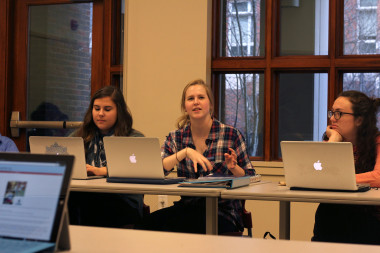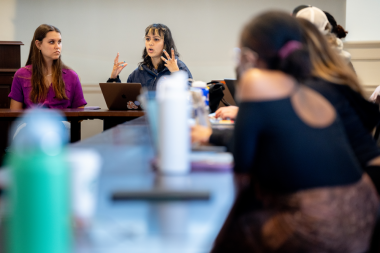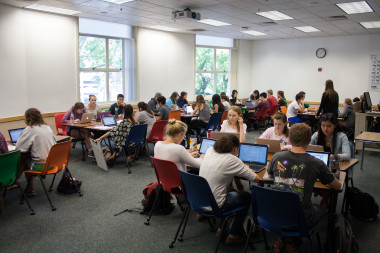New to Teaching Hub
Check out the newest collections on the site from the last few months.
Collections

Holistic Approaches to Learning Objectives
Do you find that your course learning objectives don't fully capture the goals you and your students have for their learning and development? This collection points to a variety of frameworks for developing more holistic learning, where the humanity of our students is at the center.

Digital Media Projects in Chemistry: An Annotated Assignment
This collection explores a digital media project in a general chemistry course. Included are the assignment description, a sample student project, and resources to support students' work and instructor assessment efforts. Be sure to read the annotations on the linked files.

How Can You Help Your Students Use Generative AI Tools Responsibly and Ethically?
How can you help develop students’ AI literacy, even when you’re not an expert in AI? In this collection, you'll find articles and activities that articulate and develop key AI competencies for educators and your students.

Frameworks and Activities for Fostering AI Literacy
This collection features frameworks for understanding AI literacy—including one framework developed here at UVA—as well as classroom activities that support the development of AI literacy in both students and instructors.

Creating a Classroom Environment in Which Civil Discourse Can Thrive
Are fostering civil discourse and dialogue across difference teaching goals for you? Don't wait until potentially controversial topics emerge and hope for the best. Start cultivating community on day 1 by using some of the activities described in this collection.

Supporting Faculty through AI Transition: Tools for Educational Leaders
Faculty are adapting to AI in complex ways beyond simple adoption or resistance. This collection provides educational leaders with frameworks to understand faculty decision-making, identify change barriers, and facilitate inclusive AI integration conversations.

Assessing Student-AI Collaboration: Innovative Grading & Rubric Strategies
Generative AI has brought new urgency to longstanding assessment challenges. How do we grade individual contributors within a collaboration? What belongs to the human, and what to the technology? This collection offers new approaches to assessing human-AI collaboration in educational settings.

Teaching with Custom AI Chatbots
The default behaviors of popular AI chatbots don't always align with our teaching goals. This collection explores approaches to designing AI chatbots for particular pedagogical purposes.

How Can AI Support Accessibility and Universal Design for Learning (UDL)?
This collection introduces you to resources when beginning or scaling-up your use of artificial intelligence (AI) in ways which strengthen or enhance accessibility or opportunities for universal design for learning (UDL).

Sharing SoTL Findings
These resources support faculty interested in writing and publishing SoTL, from getting started to preparing a manuscript for submission. They offer practical guidance, examples, and insights into developing a strong SoTL story, finding publication venues, and structuring articles.

Qualitative Analysis in SoTL
This collection provides an overview of qualitative analysis, guidance for selecting and conducting qualitative analysis, including thematic analysis and constant comparative analysis, and the role of validity and reliability in qualitative research.

Quantitative Analysis in SoTL
Analyzing SoTL data requires the appropriate methods. This collection provides guidance for quantitative analysis, including tools for selecting statistical tests, step-by-step instructions for conducting analyses, and examples from common SoTL study designs.

SoTL Data Management and Documentation
Effective data management is essential to your SoTL project’s organization, reproducibility, and meaningful dissemination of findings. This collection provides guidance and practical tools for organizing your data, creating documentation, and avoiding common pitfalls.

Dialogue & Deliberation Across Differences
The ability to have productive and respectful discourse with folks holding different values, identities, and opinions is critical for a functioning democracy, but challenging to foster. This collection supports instructors preparing students to engage across differences.

Essentials for Collaborative Learning Groups
Whether you're organizing informal in-class groups or assigning out-of-class group projects, it takes care to make group work run well. This collection features our favorite resources for supporting students through sustained collaboration in persistent or ephemeral learning groups.

Practice and theory of relationship-rich pedagogies
When people talk about relational pedagogy and relationship-rich academic practice, what do they mean, and what are the practical implications? Use this collection to orient yourself to the contemporary conversation about relationship-rich academic environments.















